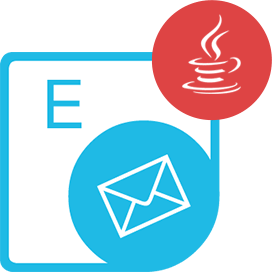<dependency>
<groupId>com.aspose</groupId>
<artifactId>aspose-email-cloud</artifactId>
<version>1.0.0</version>
</dependency>compile(group: 'com.aspose', name: 'aspose-email-cloud', version: '1.0.0')<dependency org="com.aspose" name="aspose-email-cloud" rev="1.0.0">
<artifact name="aspose-email-cloud" ext="jar"/>
</dependency>libraryDependencies += "com.aspose" % "aspose-email-cloud" % "1.0.0"Manage Emails in Cloud via Java REST API
Product Page | Documentation | Live Demo | Swagger UI | Code Samples | Blog | Free Support | Free Trial
Aspose.Email Cloud SDK for Java helps you work with 3D file formats within your cloud-based Java Apps, without installing any 3rd party software. It is a wrapper around Aspose.Email Cloud REST APIs.
Cloud Email Processing Features
- Works with different emails’ formats such as Outlook® MSG, EML, VCard, and iCalendar® files.
- Supports AI functions: – Business card recognition – Parse business card image to vCard – Parsing and handling of personal names – Detect similar names – Identify person’s gender based on name – Suggest possible alternatives of a name – Guess person’s name based on its initials
- Provides built-in email client: – Supports IMAP, POP3, SMTP, EWS, WebDav. – Virtual multi-account – Message threads (POP3 accounts are also supported)
- Email configuration discovery
- Disposable email address detection.
Email Cloud Storage Features
- Upload, download, copy, move and delete files, including versions handling (if you are using Cloud storage that supports this feature - true by default).
- Create, copy, move and delete folders.
- Copy and move files and folders accross separate storages in scope of a single operation.
- Check if certain file, folder or storage exists.
Supported Email File Formats
Microsoft Outlook®: MSG
Email: EML, MSG, MHTML, HTML
HTML: HTML, MHTML
Contact: VCF, MSG
iCalendar®: ICS, MSG
MAPI: MSG, TNEF, EMLX
Business Card Recognition AI: PNG, JPG or JPEG, TIFF, BMP, GIF
Requirements
Building the API client library requires:
- Java 1.7+
- Maven
Prerequisites
To use Aspose.Email Cloud SDK for Java you need to register an account with Aspose Cloud and lookup/create Client ID and Client Secret at Cloud Dashboard. There is free quota available. For more details, see Aspose Cloud Pricing.
Installation
Install from Maven
Add Aspose Cloud repository to your application pom.xml
<repository>
<id>aspose-cloud</id>
<name>Aspose Cloud Repository</name>
<url>https://releases.aspose.cloud/java/repo/</url>
</repository>
Install from source
To install the API client library to your local Maven repository, simply execute:
mvn clean install
To deploy it to a remote Maven repository instead, configure the settings of the repository and execute:
mvn clean deploy
Refer to the OSSRH Guide for more information.
Maven users
Add this dependency to your project’s POM:
<dependency>
<groupId>com.aspose</groupId>
<artifactId>aspose-email-cloud</artifactId>
<version>21.9.0</version>
</dependency>
Others
At first generate the JAR by executing:
mvn clean package
Then manually install the following JARs:
target/aspose-email-cloud-21.9.0.jartarget/lib/*.jar
Usage examples
To use the API, you should create an EmailCloud object:
EmailCloud api = new EmailCloud("Your Client secret", "Your Client id");
Business cards recognition API
Use AiBcrApi.parse method to parse business card image to VCard DTO:
byte[] fileBytes = IOUtils.toByteArray(new FileInputStream("/tmp/alex.png"));
ContactList result = api.ai().bcr().parse(Models.aiBcrParseRequest()
.file(fileBytes)
.isSingle(true)
.build());
ContactDto contact = result.getValue().get(0);
assert contact.getDisplayName().contains("Parsed Display Name");
Licensing
All Aspose.Email Cloud SDKs, helper scripts and templates are licensed under MIT License.
Authorization & Authentication
Authentication schemes defined for the API is as follows:
JWT
- Type: OAuth
- Flow: application
- Authorization URL: https://api.aspose.cloud/connect/token
Recommendation
It’s recommended to create an instance of ApiClient per thread in a multithreaded environment to avoid any potential issues.
Product Page | Documentation | Live Demo | Swagger UI | Code Samples | Blog | Free Support | Free Trial
| Version | Release Date |
|---|---|
| 21.9.0 | September 21, 2021 |
| 21.4.0 | April 13, 2021 |
| 20.12.0 | December 30, 2020 |
| 20.10.0 | October 29, 2020 |
| 20.9.0 | September 9, 2020 |
| 20.7.0 | July 23, 2020 |
| 20.5.0 | May 27, 2020 |
| 1.0.1 | May 11, 2020 |
| 20.3.0 | March 16, 2020 |
| 20.2.0 | February 26, 2020 |
| 20.1.0 | January 28, 2020 |
| 19.12.0 | December 31, 2019 |
| 19.11.0 | November 27, 2019 |
| 1.0.0 | July 24, 2015 |
| File | Classifier | Size |
|---|---|---|
| aspose-email-cloud-1.0.0-javadoc.jar | javadoc | 103.25 KB |
| aspose-email-cloud-1.0.0-sources.jar | sources | 10.83 KB |
| aspose-email-cloud-1.0.0.jar | 18.18 KB | |
| aspose-email-cloud-1.0.0.pom | 4.28 KB |
Aspose Java REST API Maven SDK Java SDK Cloud REST REST API Cloud API MIT JWT oauth Aspose.Total Cloud MSG EML send email email MIME oauth attachment email attachment cloud email email flag vcard icalendar html mhtml ocr recognition AI artificial intelligence smart parse TNEF EMLX ICS VCF PNG JPG JPEG TIFF BMP GIF Aspose.Email Aspose.Email Cloud

